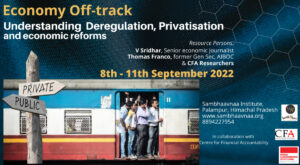08 September, 2022 9:00 am
Background:
The country is witnessing an outburst of youth anger manifested through their protests against hiring policies in the armed forces, railways, and other recruitments which guarantee secured government jobs. Political observers have noted that the protests are a manifestation of massive unemployment in the country and a breakdown in the economic structures. The slowdown in the economy had started much before the Covid-19 pandemic hit the country with high unemployment and low labor participation rate leading to weak demand and further slowing down of aggregate demand, production, investment, and job creation. The pandemic, which has come after disastrous policies such as demonetization, and GST, along with the brutal lockdown decisions, resulted in a situation where the economy was contracted by 7.3% in 2021.
According to a new RBI report, the Indian economy will take more than a decade to overcome the losses caused by the outbreak of the Covid-19 pandemic. The trend however is not to adopt a different development path to build back but to intensify the process of neoliberal reforms furthering a push towards the greater opening of the economy through various policies offering ‘ease of doing business including tax cuts to corporates, write-offs, privatization of airports, public sector units like Air India, attempts for bank privatization, divestment of shares from LIC, etc. The divestments, privatization, etc. are supposed to fund massive infrastructure development projects in the country. The government expects the post-covid growth story to be finance-led growth. The outburst of youth and other people is thus a result of all that is happening on the economic front. It is, therefore, necessary to understand the policies, trajectories, and movers of this new growth framework and how it impacts the life and livelihood of the people.
This workshop will help the participants to understand the reasons for the derailment of the economy and the processes of policies which are being followed, its impact and implications, the reforms which are in pipeline – to understand the trajectory of change. The workshop will help participants understand:
- The state of reforms in the country and its impacts
- Analysis of finance mobilizations through asset monetization and disinvestments
- The rising role of private finance and how to track private finance
- The trajectory of public sector banking and reforms
- Role of international finance in pushing post-covid reforms
- Rising wealth inequality based on the financialization
- Understanding current changes from a gender perspective
- Tracking development finances for a project
The workshop will help participants to understand and analyze collaboratively the discussions around finance and its policies whether it is on GST, IBC, LIC, Public sector banks, International Finance Institutions like World Bank, etc. If future growth is linked with finance-led growth, it is important that activists and civil society organizations get accustomed to some of these debates and their implications. Further, the workshop will help participants understand the financial actors, sources, and tracking of development finance.
Methodology:
The sessions will be non-technical; they’ll be taken by researchers, civil society leaders, and activists. No prior training in economics or any other discipline is needed. We will discuss the history, reforms, and impact of the issues related to the above-mentioned themes through lectures, case studies and group discussions. Sessions will be followed by Q&A sessions. A set of readings will be sent in advance to help the participants engage better.
Program Schedule: Please click here to see the schedule for 4 days
Language: The primary medium of instruction will be in English.
Resource persons:
V Sridhar: Sridhar specializes in economic journalism. He has been a journalist since 1987 and has worked with The Hindu Group since 1991. Currently, he is a commissioner in the Peoples Commission on Public sector and Public services.
Thomas Franco: He is the former general secretary of All India Bank Officers Confederation and currently coordinates the Peoples Commission on Public sector and public services
Researchers from CFA (Anuradha Munshi, Gaurav Dwivedi, Anirbhan Bhattacharya, Priyadharshini, Maju Varghese)
Who is this workshop for?
The workshop will be useful for activists, students, and groups to understand how deregulation is resulting in privatization and other business-friendly measures being taken by the government. It will look into banking reforms, specific case studies on privatization of LIC, wealth inequality, the role of private finance, and how people can monitor finance. It gives an understanding of financial activism by linking it with the social and economic movements of our times.
Dates and Venue: 8th to 11th September 2022, Sambhaavnaa Institute, VPO – Kandbari, Tehsil – Palampur, District – Kangra, PIN 176061, Himachal Pradesh
Participant Contribution: We hope that participants would contribute an amount of Rs. 5000/- towards workshop expenses, inclusive of all on-site workshop costs: boarding, lodging, and all the materials used in the workshop. Travel of participants will have to be borne by the participants/respective organisation.
Do not let money be an impediment to your application. Need-based fee waivers are available. We have a limited number of scholarships so please apply for a fee waiver if you really need it. Do remember that there may be others who need it more than you. The fee waiver will be offered to people from marginalized groups and non-funded social, political, or student movements.


Hi,
Are any safety measures being put in place with regards to the recent land slides in H.P.? Might there be a change of venue, etc.?
It would be good to know before tickets are booked and payment for registration is done as well.
We are monitoring the situation. Will update by the end of the week, in case it is difficult to go ahead with the workshop.